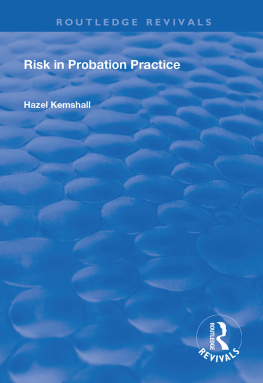
Redemption, Rehabilitation and
Risk Management
Redemption, Rehabilitation and Risk Management provides the most accessible and up-to-date account of the origins and development of the probation service in England and Wales.
The book explores and explains the changes that have taken place in the service, the pressures and tensions that have shaped change, and the role played by government, research, Napo and key individuals from its origins in the nineteenth century up to the plans for the service outlined by the Conservative/Liberal Democrat government.
The probation service is a key agency in dealing with offenders; providing reports for the courts that assist sentencing decisions; supervising released prisoners in the community and working with the victims of crime. Yet despite dealing with more offenders than the prison service, at lower cost and with reconviction rates that are lower than those associated with prisons, the probation service has been ignored, misrepresented, taken for granted and marginalised, and probation staff have been sneered at as do-gooders. The service as a whole is currently under serious threat as a result of budget cuts, organisational restructuring, changes in training and increasingly punitive policies. This book details how probation has come to such a pass.
By tracing the evolution of the probation service, Redemption, Rehabilitation and Risk Management not only sheds invaluable light on a much misunderstood criminal justice agency, but offers a unique examination of twentieth-century criminal justice policy. It will be essential reading for students and academics in criminal justice and criminology.
George Mair has been Professor of Criminal Justice in the School of Law, Liverpool John Moores University since 1995. Previously, he was Principal Research Officer in the Home Office Research and Planning Unit. He is a leading authority on community penalties and has published widely on this topic. He was a member of the Merseyside Probation Board, 20017.
Lol Burke is Senior Lecturer in Criminal Justice, Liverpool John Moores University. He has worked as a Probation Officer and a Senior Probation Officer. He was involved in the delivery of probation training prior to his appointment at LJMU. He is editor of the Probation Journal.
This is an important, timely, and hugely engaging and challenging book. The esteemed authors offer a sophisticated account of the changes within the probation service over the past hundred years and critical reflection on what has happened since. Essential reading for students and academics in criminal justice and criminology, of course, but every politician and policy maker should be required to read the book too, and to reflect and act upon its key messages.
Professor Loraine Gelsthorpe, Institute of Criminology,
University of Cambridge
Redemption, Rehabilitation and Risk Management is a comprehensive, engaging and timely history of the probation service in England and Wales which will be an essential resource for students and academics alike. Drawing on their considerable experience in research and practice contexts, George Mair and Lol Burke have produced an extremely valuable contribution to the literature on probation which charts the fascinating evolution, over more than a century, of a key player in the criminal justice system.
Dr Gwen Robinson, Reader in Criminal Justice, Sheffield University
Redemption, Rehabilitation
and Risk Management
A history of probation
George Mair and Lol Burke
First published 2012
by Routledge
2 Park Square, Milton Park, Abingdon, Oxon, OX14 4RN
Simultaneously published in the USA and Canada
by Routledge
711 Third Avenue, New York, NY 10017
Routledge is an imprint of the Taylor & Francis Group, an informa business
2012 George Mair and Lol Burke
The right of George Mair and Lol Burke to be identified as the authors of this work has been asserted by them in accordance with sections 77 and 78 of the Copyright, Designs and Patents Act 1988.
All rights reserved. No part of this book may be reprinted or reproduced or utilised in any form or by any electronic, mechanical, or other means, now known or hereafter invented, including photocopying and recording, or in any information storage and retrieval system, without permission in writing from the publishers.
Trademark notice: Product or corporate names may be trademarks or registered trademarks, and are used only for identification and explanation without intent to infringe
British Library Cataloguing in Publication Data
A catalogue record for this book is available from the British Library
Library of Congress Cataloguing in Publication Data
Mair, George.
Redemption, rehabilitation and risk management: a history
of probation / George Mair and Lol Burke.
p. cm.
1. Probation-Great Britain. 2. Rehabilitation-Great Britain. I. Burke, Lol. II. Title.
HV9345.A5M35 2011
364.6'30941-dc22 2011006344
ISBN 13: 978-1-84392-250-6 hbk
ISBN 13: 978-1-84392-249-0 pbk
ISBN 13: 978-0-20380-596-1 ebk
Typeset in Times New Roman
by Glyph International
Contents
List of tables
Acknowledgements
For a number of reasons, this book took rather longer to complete than we had planned and we are grateful to Brian Willan for his patience (little did we realise that he would have retired before we finished writing). That virtue seems to have been inherited by his daughter Julia who has waited without complaint.
Our thanks are also due to Judith Rumgay, who read and commented astutely on the opening chapters, and our colleague Matthew Millings who read the whole manuscript.
Part of is based on George Mair's article Developments in Probation in England and Wales 198493, contained in a 1996 collection of essays edited by Gill McIvor, entitled Working With Offenders (London: Jessica Kingsley).
Finally, of course, we owe our families a serious debt of gratitude for all their understanding and support while we worked on the book. George would like to thank Carmel for her unfailing love and patience, as well as his children Ruth and Ethan. Lol would like to acknowledge the debt of thanks he owes his parents Morgan and Veronica who passed away before this book was completed. The love and support they gave throughout their lives continues in the memories of their family.
Introduction
In 2007 the probation service in England and Wales was 100 years old. Its birthday was celebrated by several major conferences as well as booklets providing an overview of the history of the service (National Probation Service 2007; Napo 2007). Understandably, there was a great deal of satisfaction in what the service had achieved in its 100 years and how far it had come, but it was notable that in the respective booklets both the Director of Probation in the Home Office and the National Association of Probation Officers (Napo) representing probation staff spoke of uncertainty about the future of the service, thereby tempering the celebratory mood. And there was a lot to be anxious about. Probation had been under persistent attack by Conservative and Labour governments since the early 1990s. It had been subject to fundamental structural change as it was reorganised into a National Probation Service under direct government control in 2001, and then had become a part of the National Offender Management Service (NOMS) in 2004 alongside the prison service (although in 2007 it was still unclear exactly what form NOMS would take). The Offender Management Bill, which had been presented to Parliament in November 2006, contained provisions to end the monopoly of Probation Boards on providing probation services and to replace Boards with Trusts. The promise of the Effective Practice Initiative had remained unfulfilled. New sentences the community order and the suspended sentence order had recently replaced the probation order, the community service order and the various other community sentences run by the service. And the pressure to meet externally imposed targets was unrelenting. For probation service staff, then, celebration might not have been the most appropriate response to the centenary; a more considered response would have been to ask how it had come to this.






